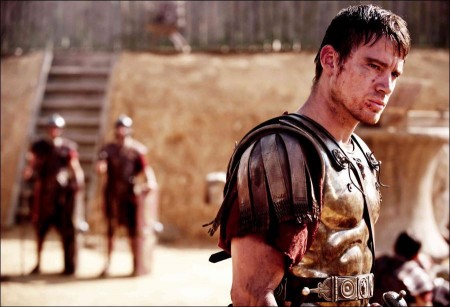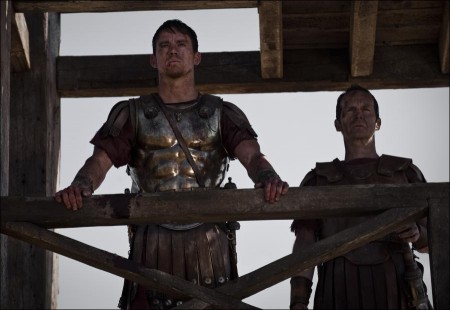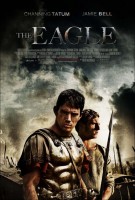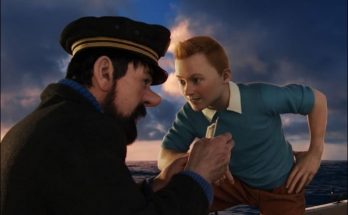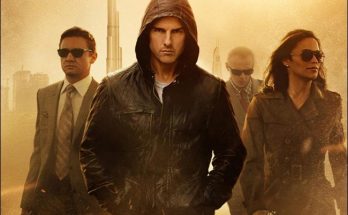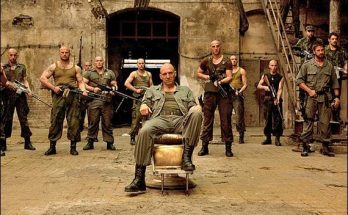Taglines: The destiny of a soldier. The honour of a slave. The fate of an empire.
In 140 AD, two men – master and slave – venture beyond the edge of the known world on a dangerous and obsessive quest that will push them beyond the boundaries of loyalty and betrayal, friendship and hatred, deceit and heroism… The Roman epic adventure The Eagle stars Channing Tatum and Jamie Bell and is directed by Academy Award winner Kevin Macdonald.
20 years earlier, Rome’s 5,000-strong Ninth Legion, under the command of Flavius Aquila, marched north carrying their treasured golden Eagle emblem. They never returned; Legion and Eagle simply vanished into the mists.
Hearing a rumor that the Eagle has been seen in a tribal temple in the far north, Flavius’ son Marcus (Tatum), determined to restore the tarnished reputation of his father, is galvanized into action. Accompanied only by his slave Esca (Bell), Marcus sets out into the vast and dangerous highlands of Scotland – to confront its savage tribes, make peace with his father’s memory, and retrieve the hallowed Eagle. Along the way Marcus realizes that the mystery of his father’s disappearance may well be linked to the secret of his own slave’s identity and loyalty – a secret all the more pressing when the two come face-to-face with the warriors of the fearsome Seal Prince (Tahar Rahim).
Centuries, Decades, Years
Late in the 20th century, one of Britain’s top movie producers, BAFTA Award winner and Academy Award nominee Duncan Kenworthy, noticed that a certain kind of story wasn’t being told any more on-screen; where, he wondered, were the historical dramas of high adventure?
He recalls, “As a boy, I’d read and loved all Rosemary Sutcliff’s novels about the Dark Ages, and about Roman Britain, but especially The Eagle of the Ninth. I remember describing it to Mike Newell, when we were on set shooting [the Best Picture Oscar nominee] Four Weddings and a Funeral in 1993, as my favorite childhood book. “Mike told me one of his kids was at that very moment reading and loving it – many years after me – and that sent me back to it one more time. It’s a wonderfully resonant and exciting story, with characters, issues, and emotions as vivid to me today as when Rosemary dreamed them up. I decided there and then that one day I would make a movie of it.”
Sutcliff had based her 1954 story on a tantalizing piece of then-current historical research: the disappearance of Rome’s Ninth Legion. Stationed for several years in Eburacum – present-day York, in northern England – the Ninth suddenly vanished from the records in 120 AD, giving rise to the belief that they had marched north into Scotland and never returned. Today’s historians are divided as to whether the Ninth did indeed vanish in the north, or whether they were instead posted elsewhere, but the original story of their disappearance remains historically viable. The novel, which has sold more than 1,000,000 copies over the decades, was previously dramatized for the U.K.’s Radio 4; and was made into a BBC serial of six half-hour episodes in 1977.
Kenworthy reached out to the late author’s agents, estate and publisher, but he had backto- back projects in the 1990s. So it wasn’t until 1998, during the making of another of his hit movies, that things progressed. He reports, “I have a vivid memory of standing on location in the Ritz Hotel in London – shooting Notting Hill – on the phone to the Oxford University Press about the movie rights.”
At first, Kenworthy’s intention was to make a big-budget sword-and-sandal movie out of the book, and when Gladiator became a blockbuster hit and the Best Picture Oscar winner of 2000, the cinematic pendulum swung in favor of his vision. Then Kenworthy’s pursuit of the rights in The Eagle of the Ninth came to the attention of director Kevin Macdonald. The filmmaker had won an Academy Award for his documentary feature One Day in September and had also recently made the docudrama Touching the Void. Kenworthy notes, “I already knew Kevin; his brother Andrew and I had started DNA Films together and Andrew was my producing partner at the time. Kevin came to me saying he’d heard I had the rights to The Eagle of the Ninth, and that he’d always wanted to direct a Roman adventure movie and had always loved this book. Could he direct it?
“At that point, though, I didn’t yet have a script – I’d been waiting several years for one particular British writer who was passionate about the book but still unavailable – and Kevin had never done a narrative feature, let alone a big picture, so I didn’t think there was much point in talking. I’d only ever hired a director after I had a script I felt was ready to go; developing a film with a director was something I had never done before.”
Macdonald, like Kenworthy, had carried the book in his consciousness for years. He remembers, “I read the novel when I was about 12 years old and was absolutely held by it. There was something about the atmosphere on the edge, and the way in which these cultures met – the Celtic, the British, and the Roman Empire – that stuck with me. The book fed my love of history, and now I felt I could tell it on film in a way that did justice to it and depict incredible worlds of 2,000 years ago.
“The story is also about friendship; the lead characters are two people from different cultures who don’t understand each other and who see the world in different ways, and who must move beyond that to see each other as human beings.”
While the producer considered how to proceed, the movie industry sought to capitalize on Gladiator. Kenworthy comments, “A couple of ‘historical epics’ were made and released, and they represented the road I quickly realized I didn’t want to travel with The Eagle. They were too big, with too many computer-generated effects – replicated armies, invented cultures, and characters that didn’t seem to me to belong to the real world.
“What’s always been central to the appeal of The Eagle to me is powerful and credible emotional storytelling about real characters in a real world. Two men struggling through the mountains of Scotland; wet, cold, hungry, once wanting only to die but now driven to succeed. Yes, they pray to different gods, and the world is violent, but we know these men; we feel the passions that drive them. They just happen to live 2,000 years ago. I realized then that it would be wrong to inflate it in any way; that it should be as authentic as a documentary made by Romans, wearing their own clothes, shot in the places they’d actually journeyed to. Exciting, of course – entertaining, certainly – but feeling real in every way. And with that realization, Kevin became the perfect person to direct it.”
So in 2005 Kenworthy contacted Macdonald, who was preparing DNA’s The Last King of Scotland. He notes, “Kevin didn’t hold it against me that I had hesitated the first time around, and we’ve been working on it together ever since.”
Macdonald had been very impressed by screenwriter Jeremy Brock’s work on The Last King Of Scotland, and immediately proposed bringing him on board to adapt The Eagle of the Ninth. Kenworthy remembers, “We had another writer on The Eagle at first, one who was great but just couldn’t crack it. I was paying for the development myself, so it was a big decision for me as to whether to roll the dice again. Kevin suggested Jeremy, whose work I’d admired since Mrs. Brown, so I decided to give it one more go.”
“It turned out to be a fantastic threesome. If it’s just two of you – writer/director and producer, or producer/director and writer – it can often go smoothly, but it’s rarely a marriage of equal voices. But having three people, each with a different perspective, somehow breaks the impasse; disagreement is simply one more way of moving forward. The three of us working together resulted in some of my most enjoyable moments on the film. We used to sit in Jeremy’s office high on Highgate Hill, talking about the story all day, testing ideas and coming up with new ones. Jeremy would go off to rewrite and then we’d come back and go through it all again. To have such privileged creative experiences is the reason I’m making movies.”
Macdonald remarks, “The Eagle explores a specific part of history that has rarely been seen on the big screen before. Movie audiences haven’t much seen these people, these cultures, and these landscapes. Speaking of which, Black Robe is one film that influenced my concepts for making The Eagle.”
The movie could already be seen in Brock’s pages. According to Kenworthy, “The key narrative structure of the film – two men on an impossible quest – isn’t itself complicated, though it has surprising twists and turns. But there are some very rich resonances. These two men are completely different: Roman and Briton, conqueror and conquered, neither of them liking or even understanding the other, yet tied together – not literally, like the two convicts in The Defiant Ones, but as master and slave.
“Yet they have strong similarities too: both of them are orphans, powered by the memory of the father they’ve lost, each at one point wanting to die, but saved – unwillingly and even inexplicably – by the other. The potential for all these emotional complexities, of dependency and resentfulness, longing and hope, was certainly there in the book, but Jeremy’s work has undoubtedly made the central relationship richer.”
Macdonald explains, “While Jeremy has many great qualities as a writer, what’s particularly important is that he understands that characters need not be sympathetic all the time. To me, the more interesting movies are those that have ambivalent characters who can morally cross a line but still keep the audience on their side; Jeremy brings out in The Eagle the tremendous complexity between the two main characters, a friendship that is very hard-won. Marcus and Esca have to go through a lot – physically and emotionally.”
Unlike the producer and director, Brock had no familiarity with the book, but on reading it he “immediately saw the potential for an exciting and entertaining ‘quest movie’ that would also provide the opportunity to explore friendship, rites of passage, and the clash of cultures.
“Adapting a book requires the screenwriter to stay faithful to the book, but not so faithful that the screenplay doesn’t become a proper movie. What I do is I read a book again and again. Then I put it aside, and I get possessive about the film.”
Adapting a book about 2nd-Century Roman-occupied Britain into a major motion picture also required a fair amount of research. Brock notes, “We went up to Hadrian’s Wall – actually flew the length of it in a helicopter. We spoke to archaeologists and academics to get a sense of what it would have been like travelling north of the Wall, as Marcus and Esca do in the story. It was very important for it to be historically accurate, but not at the expense of the drama; that’s a balance the screenwriter needs to strike.”
“I find that collaboration in the screenwriting process depends on the producer and the director, and how open they are to your ideas and how incisive they are about the script. Both Duncan and Kevin are gifted at development. We spent nearly two years, on and off, meeting in the flat where I write in London.”
During this time, the trio made the crucial creative decision that the Romans would be played by American actors and the Britons would be played by British actors. As Brock explains, “It was key to our conception of the movie. We drew an analogy between Roman imperialism and the supremacy of the American military in the world today. It affords us a clear and concise paradigm which the audience will grasp; the clash of cultures is clearly projected in the difference of accents.”
Macdonald elaborates, “There is a convention in Roman Empire films that the Romans be played by Brits, and the Americans play the slaves or freedom fighters. In the 1940s and 1950s, Britain itself was more of an empire so that was likely a factor, but nowadays it made far more sense to have Americans playing the Romans because America is the empire of today.
“Through Marcus and Esca, The Eagle addresses the extent of an empire; how far can you conquer a people, and how far you can conquer individuals and change their culture? So there are certainly parallels with world events in the 21st Century; you’re always looking at the past through your present.”
He adds, “The major change that we made from the book was in making the Marcus/Esca relationship more complicated and fractious; who is the master and who is in control at any one point in the story changes all the time.”
After working on the screenplay development and seeing the finished cut of The Last King of Scotland, Kenworthy realized that he had entrusted The Eagle to “one of the most visceral movie directors working today.”
The Eagle
Directed by: Kevin Macdonald
Starring: Channing Tatum, Jamie Bell. Istvan Göz, Bence Gerö, Denis O’Hare, Paul Ritter, Tahar Rahim
Screenplay by: Jeremy Brock, Rosemary Sutcliff
Production Design by: Michael Carlin
Cinematography by: Anthony Dod Mantle
Film Editing by: Justine Wright
Costume Design by: Michael O’Connor
Set Decoration by: Rebecca Alleway
Art Direction by: Neal Callow, Peter Francis, Zsuzsa Kismarty-Lechner
Music by: Atli Örvarsson
MPAA Rating: PG-13 for battle sequences and some disturbing images.
Studio: Focus Features
Release Date: February 11, 2011
Hits: 116
